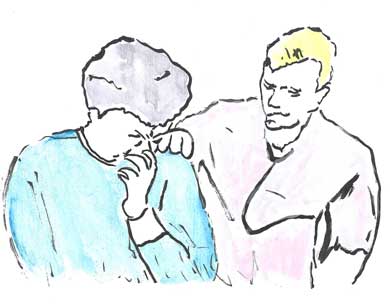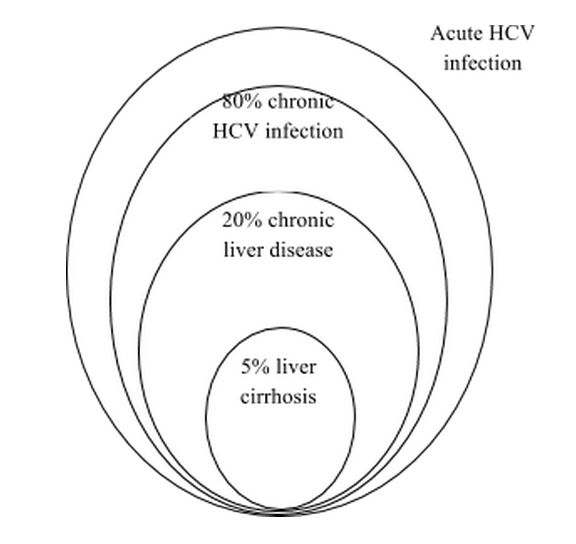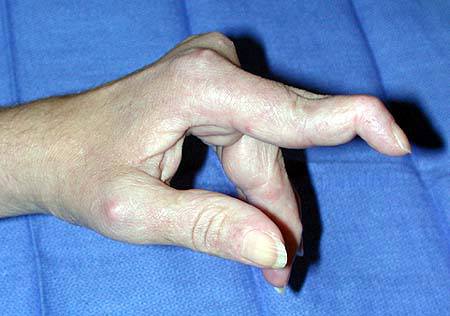Am I lying to the patient?

Few days back, me and my friend (currently doing residency at US), were discussing the differences in medical practice between Nepal and USA. I have shared a situation which I had faced recently. An old lady in her 70s came with her daughter and other relatives visited our OPD with complaints of deep yellow eyes and skin and pain in her belly. The blood and USG report showed obstructive jaundice and a gallbladder mass, most likely Carcinoma of Gall bladder. I asked my friend about the way in which she would have told this bad news to the patient or their family. She replied that she would firstly take the patient in a private room, ask what the patient thinks she has, then tell her the diagnosis, discuss about the management options with her and her family, give her time, tell her the truth but also give her the hope that she would always be by the side of the patient, etc. Or you can say ‘just as we read in any Medical ethics book’.
Breaking a bad news is never an easy job. Most of us who do this are never taught or trained for this job. We see around us, listen and watch our seniors doing this and copy them. For myself I couldn’t go according to the ethics. I couldn’t say “it looks like you have a cancer”. I couldn’t utter the word ‘cancer’. But I told her that “it looks like a bad disease and you need to go to a higher center for further check up” and as she got out of the OPD, I told to her daughter, “it looks like cancer.”
Why did I do this?
To know this you have to place yourself in my situation first. Imagine the real scenario of the working condition, settings, patient education, understanding level and many more in our hospitals. Your duty isn’t finished just by telling the harsh truth in their face.
First imagine the OPD scene of our government hospitals in rural villages – understaffed but overflowed with patients. We don’t have a patient room for consultation and doctors don’t go to those private rooms to see their patients. We have a common OPD room where 2-3 doctors sit and see their patients. Patients wait for their turn outside the room, sometimes inside also, for their turn. So most of the time privacy is the last thing we can think of. Good thing about it is that many times we all can have a good laugh on a single joke, counsel them in single if they have same problem. But the bad thing is we and our patients have least privacy if we want any. Discussions about sexual life, personal issues, life decisions and psychological issues become very uncomfortable for both the patients and the doctors.
Another is the doctor-patient relationship. It is one of the most important things in medical field; everything in medicine starts with this and revolves around this. But are we giving enough value to this sacred relationship in our setting? If you have visited government hospitals, you may know this. Patients are never seen by a single doctor. In one visit, one doctor sees him and in next, there will be another doctor. Doctors hardly know their patients by name and same is with the patients too. What we really lack is the continuity of the care by a single or team of doctors. Patients also keep on changing doctors without informing their doctors.
This patient was also initially seen by my colleague the day before. But when the patient came to show her report she was on 24 hours duty and off from OPD. If she had wanted the same doctor to see then she had to wait another day which means they had to spend more of their meager fund for hotel just to show the investigations and get the referral.
Next thing is the amount of time we can give to this patient. Not only the doctors but all the staffs like nurses, paramedics, lab technicians, etc. are really outnumbered with the volume of patient flow. We can hardly give 5 mins to our patients to tell their story, examine them, and explain about the disease, investigations, management. The pressure from the crowd of patients waiting outside the OPD compel us. So in the above case, if I had told her it looks like ‘cancer’, I couldn’t have stopped just with that, I had to give her time to explain her about it cause many have fear with the word ‘cancer’, I had to listen to her fear, I had to give her hope. You may tell that “that’s what the doctors should do, what you didn’t do”. I also feel the same. I always have a question in my mind “Is it better to give a compromised care to all patients who come to you or to give the best care to a limited number of patients and send away all others?”
Can anybody answer me please? Does managing a patient mean only giving away some pills, or syrup for the disease?
Now let’s think in this case what if the family members had requested not to tell the patient if anything really bad comes out in diagnosis? Here in Nepal doctors mostly follow these kinds of requests from family or they discuss with family whether to disclose the diagnosis with patient of not. According to ethics the doctor is responsible to the patient mainly and he/she discusses the things with the patient directly and plan about the management. But that usually doesn’t happen here in case of senior citizens, females because most of them are dependent to their family members economically, physically and psychologically too. It’s totally different from the countries where people live independently and usually have medical insurance to bear their medical costs. Usually a ‘Jaanne Sunne’ (educated, male and who knows better in family) member comes with the patient who discusses the issues with the doctor. He takes the decision about the patient. And doctors also find it easy and quick to communicate with that ‘Jaanne Sunne’ visitor rather than spending time with their real patient.
Medical ethics says “Do not lie to your patient”. But that doesn’t mean you should tell the harsh truth at any cost. And it also doesn’t tell that “Tell the truth and your duty is over.” It expects to assess the situation of the patient, of the surroundings, tell the truth and then help your patient to cope with the life threatening condition, help them to move ahead with it.
It sounds like I am defending my wrong deed. May be I am. I am not saying that I am doing my best but we have limitations. I and the whole of our medical system need a lot of improvement.
I have shared my experience here to let you know our situation. There are many hospitals working in similar situation, many doctors working on same condition around the world. Please share what you would do in the situation like this so that it would be helpful to improve us.
Thank you, in advance.
Dr. Samir Lama
MD General Practice Resident final year
TU Teaching Hospital, Maharajgunj
(Now Mid-Western Regional Hospital Surkhet)







6 Comments
This a very good topic of discussion. I think if the patient has cancer we shouldn’t directly tell him that you are suffering from cancer. It may gives the patient nervous breakdown. And not to hide the truth even. Firstly we have to ask for the senior person from the family, to tell them what is wrong with the patient, then we have to tell the patient in such a way that the patient is suffering from a serious disease, telling not so serious that it may kill. We have to discuss the percentage of particular cancer around the world, treatment scenario and mortality. In such a way we have to give them relief as well as attention.
To be a good doctor- means also to be a good psychologist. How to tell the patient the truth which is going to be hurtful or difficult to accept? So far no perfect answer, but I think we should first take a closer look at this problem. We think and plan a lot about how to do it- in the presence of the family? Face to face? How to start? When will be the best time to say that? Unfortunately we often focus too much on being comfortable with ourselves, it is a philosophy of “taking the bitter medicine as quickly as it is possible”. Well, that is not the way it should be done. The most important here is the patient, not our awkward or uncomfortable situation, so we must focus on this human being who is waiting in front of us for the words that will change their life forever. There is a tendency- that we should always tell the truth, even the saddest one. Well, I do not think so. Patients want to hear the truth- but most of them expect from us words of hope. Saying straight from the shoulder “you have 3 months of life left” is a cruelty and should not happen. I am not defending here giving the patient false hope or just telling lies to comfort them- in such situations I usually base on some statistics data. “In your stage of illness the percentage of patients who survive 5 years is 20%”- sounds better than “it is highly possible that you won’t live longer than 5 years”. Those 20% – give hope, do not take away the faith in recovery. Though I have been working in the Oncological department since 15 years, such situations are still extremely difficult for me. And one more thing: I have been through the same situation – but as a patient, so I perfectly understand what those patients feel.I don’t know if it is right or wrong from the psychological point of view – when I see the fear of death and despair in patients’ eyes, I am telling them my story. My prognosis was poor-6 months, but here I am. I am not trying to comfort them with lies and false hope. My situation was even worse- as a doctor I was more aware of all the pain and suffering that may come. But I did not give up.That’s it.
We have the wide knowledge,a huge technical background and an evidence based medicine. This is not enough. Sometimes simple words of support or just showing the patient that he is not alone- work better than any chemotherapy.
Yes, you are right ..today almost 80% doctors are lying to patient only for money it is same.
Mr Raj, If you had read the Article before commenting, it would have been more sensible.
Dear Dr Samir,
You did a very appropriate thing considering the circumstances. I have been in medical practice in India for almost 2 decades and have seen the same pattern of disclosing information. Our conduct and experience bulit by interaction with live patients says that.Medical ethics books are written keeping the individualistic life style of their patients which is norm in western world but the exception in our world. Your patient was dependent on her family for care as well as emotional support and it is only normal to involve her supporting pillars in this knowledge. SInce you as a care provider is much less interacting with your patient it is only sensible to let her caregivers break this news to her. Further the patient will soon come to know the true nature of diease and will need shoulder of her family to lean during her grief. Our clients are not that emmotionally mature to handle their crises individually. I find the remarks of Bisnu Bahadur Bastola more of theoretical and not having the experience of working in a setup like yours
Appreciation for discussing this important concern here.
It is patient’s right to know about the disease he/she is suffering from and final yes to to the treatment plan should come from the patient himself/herself except the child, mentally disabled or unconscious patient. Explanation and councelling to the patient should be in private and in more elaborate way as far as possible. In any pretext, one should not make treatment plan and start treatment without patient’s own consent except in case of life threating situation or for life saving procedure. Letting patient to know about his/her seious disease like cancer is really a difficult matter and should be dealt in a tactful way. But we cannot run away from our responsibity to let the patient know about her diseae in the language he/her understand before starting treatment. Technique of letting to know the patient about his/her disease may vary from personto person, society to society and available time & situation. It may be direct or in presence of close relatives..one should never lie to the patient, but complications or bad effects should be always explained in a low tone and one should always be optimistic.
Comments are closed.